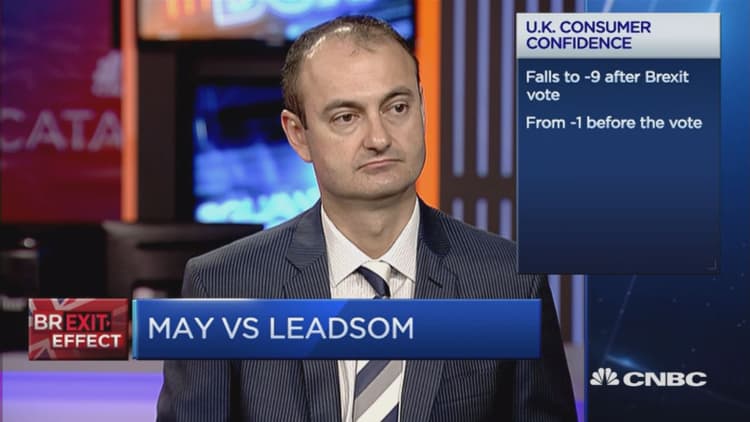
U.K. consumer confidence has fallen dramatically in the wake of the Brexit referendum result, with a drop of such magnitude not seen since December 1994.
In a one-off consumer confidence barometer to measure post-referendum sentiment, GfK, which carried out the survey, said the overall confidence index fell 8 points to -9 and that "all of the key measures used to calculate the index have fallen."
"This long-running survey dates back to 1974, and there has not been a sharper drop than this for 21 years," it said of the data published on Friday.
Overall, 60 percent of all respondents expected the economic situation to worsen over the next 12 months (up from 46 percent in June) and 33 percent believe that prices will "rise sharply" in the same time frame (up 20 percentage points from the June survey).
Somewhat unsurprisingly, "leave" voters remained more confident: "Splitting the core index result by how people said they voted in the referendum, Remainers were at -13, versus Leavers who were more optimistic at -5," GfK said.
The survey was run from 30 June to 5 July to capture the mood of consumers immediately after the Brexit vote on June 23. It surveyed 2002 respondents of all ages and social backgrounds from across the U.K. The post-referendum results were compared to the pre-referendum June 2016 consumer confidence barometer carried out by GfK.
Hopes running thin
The referendum result revealed sharp regional divisions over European Union (EU) membership, with Scotland, Northern Ireland and London as well as some other urban areas voting to remain.
The more working class areas of Northern England, Wales, East and South-West reported more support to quit the EU, however, resulting in a U.K.-wide 52 percent majority voting to leave.
The result caused immediate tumult on the economic and political scene in the U.K. and further afield. The pound dropped to a 31-year low and has remained lower since the vote while financial markets saw sharp declines. A U.K. recession in 2017 is predicted by many economists who say that consumers are likely to hold off purchases and businesses likely to hold off investment and hiring.
On the political front, there is also upheaval. Prime Minister David Cameron resigned, as well as prominent leaders of the Brexit campaign, creating a political vacuum and a sense among British voters that "no one is in charge." Scotland's leaning towards a second independence referendum following the vote also potentially signals the break-up of the U.K.
There have been reports too that, as the full consequences and complexities of leaving the EU have become clearer, many who voted to leave now regret that decision.
GfK's survey highlights the declines in consumer confidence around the country and, interestingly, consumer confidence has fallen most dramatically in the predominantly pro-Brexit North of England, dropping 19 points. In pro-Remain Scotland it has fallen 11 points while in the south (including London), there has been a 2-point drop.
Recession 'likely'
Confidence has dropped mostly among young voters aged 16-29, down 13 points, who were predominantly in the "remain" camp and who have concerns over jobs and opportunities to travel and work in the EU. From an income perspective, the biggest drop in confidence is a fall of 16 points among households with income levels of £25,000-£49,999 ($32,000 – $64,300).
The U.K. has yet to even start the withdrawal process from the EU. Prime Minister Cameron has said it is up to the next party leader and prime minister to trigger Article 50 of the Lisbon Treaty which sets the Brexit wheels in motion. This will start up to two years of negotiations with the EU about any future relationship with the U.K but the entire process of disentangling the U.K. from the EU could take many years.
Thanos Vamvakidis, head of G10 FX BofA Merrill Lynch Global Research, told CNBC on Friday that the U.K. had entered a period of "wait and see mode" and was heading for recession.
"We are seeing a (confidence shock) earlier than we had expected. It seems that investors and consumers are already in a wait and see mode and this could continue. It's very likely that the U.K. will experience a recession," he told CNBC Europe's "Squawk Box."
"We are going to have a new 'normal' and we don't know how it will look like and it will take time. They (the government) cannot activate Article 50 any time soon because they don't have the staff, they don't have a plan and they don't have a strategy and even after they activate it, this will be a very long process. So this is not a one-off shock, this is the beginning of a long process and we don't know what will be the outcome," he said.
"Even if you're optimistic about what will be at the end of it, for now, you're just waiting for the outcome….(and) uncertainty is the worst thing that you can have in this fragile market."


